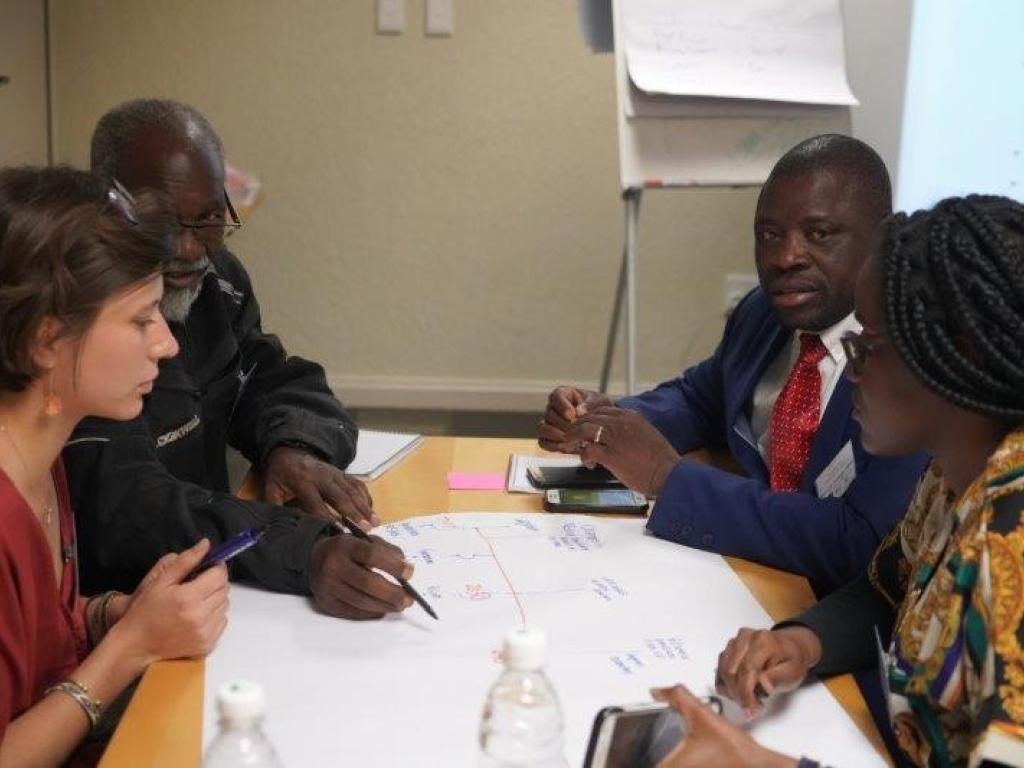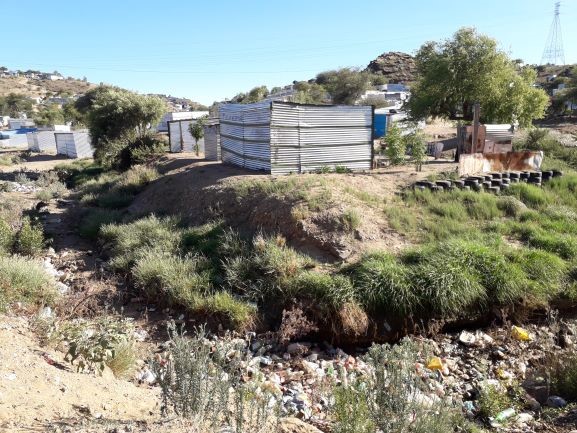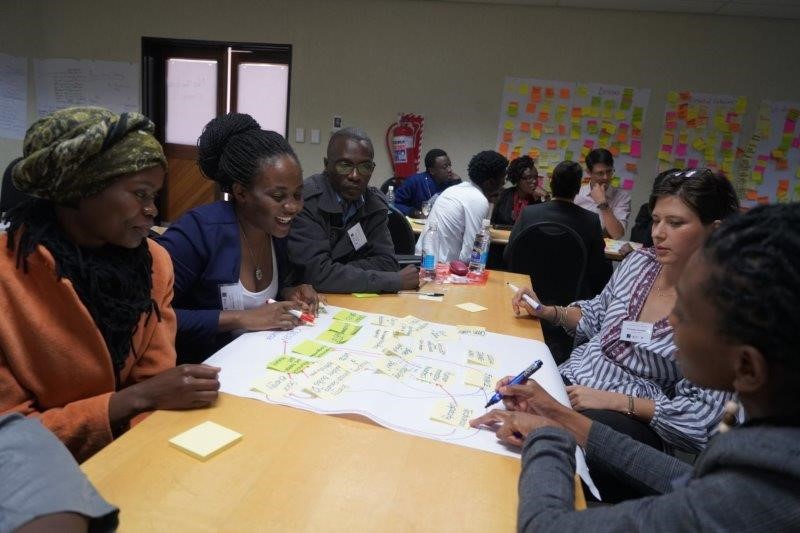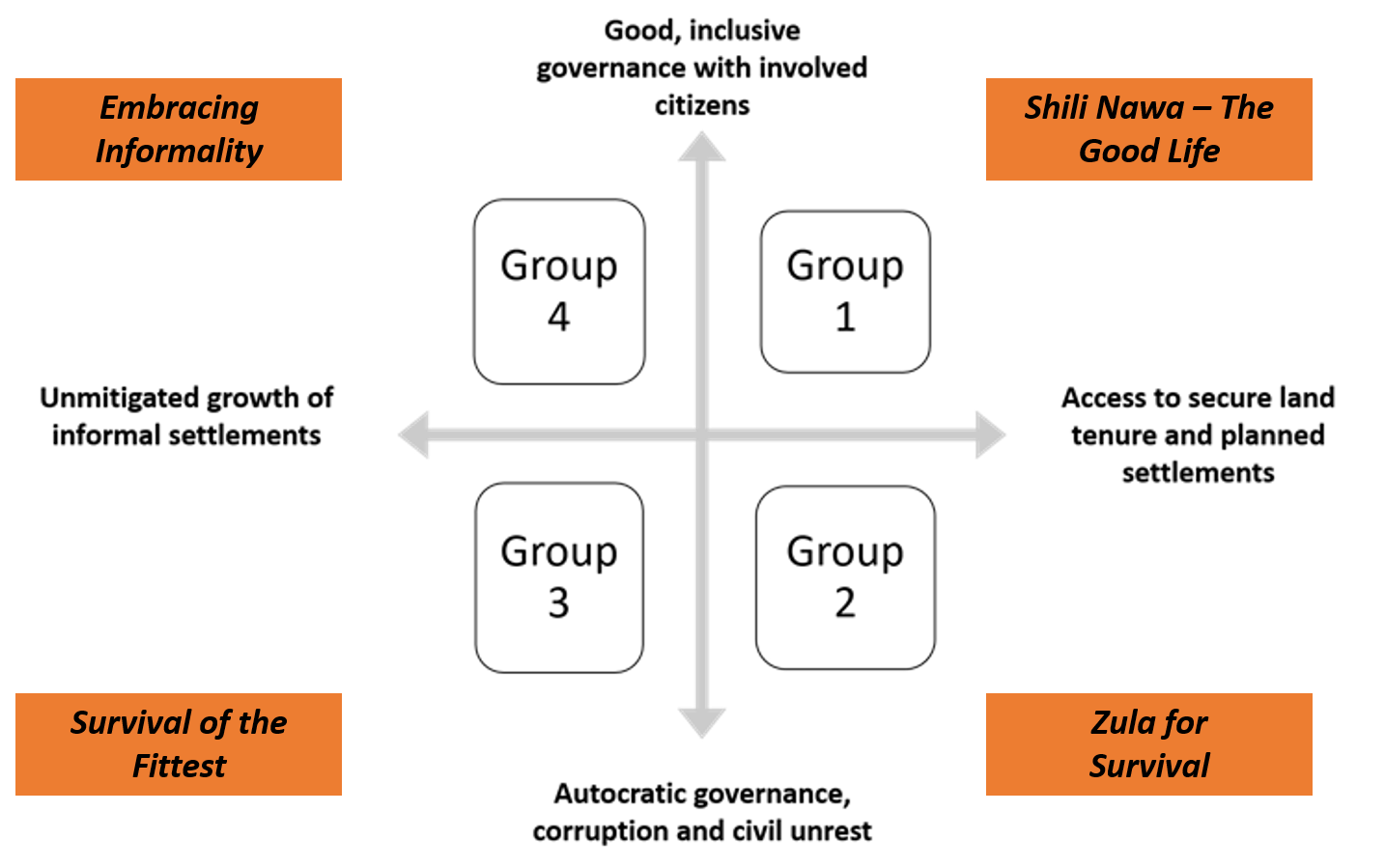Using scenario planning to determine development pathways for Windhoek’s informal settlements

By Amayaa Wijesinghe (MSc Biodiversity and Conservation Management, University of Oxford) and Dr Jessica Thorn (University of Cape Town and University of York)
Planning for an uncertain future
Governments, academia and development practitioners have long acknowledged that integrating knowledge and practices across scales, from community level to national level, is key to sustainable planning and development. Applying principals of futures thinking and scenario building to this complex challenge, the Urban Ecolution Research Programme organised a Participatory Scenario Planning Workshop in Windhoek, Namibia, from 16 – 18 July 2019 in partnership with University of Namibia, Namibian University of Science and Technology and the City of Windhoek.

(LEFT) Informal settlements in Windhoek: a shack next to the riverbed. The riverbed is used for sanitation purposes and for open dumping.
The workshop was aimed at predicting the synergies and trade-offs of water-related ecological infrastructure for climate adaptation in peri-urban settlements in Windhoek. The event also marked the official launch of Urban Ecolution (UE) in Windhoek. Diverse stakeholders convened at the Namibian University of Science and Technology to envision adaptation and development strategies. Key players in the adaptation space participated, including the Desert Research Foundation of Namibia (DRFN), Ministry of Environment and Tourism (responsible for NDCs), and the City of Windhoek’s (CoW) division on Health and Environment, mandated to draft Namibia’s first city-specific Integrated Climate Change Strategy and Action Plan ( ICCSAP for Windhoek).The Coalition on Climate Change, Hans Seidel Foundation, and University of Namibia (FRACTAL Project) were also present. FRACTAL’s ‘Learning Labs’ had previously identified the unmitigated growth and lack of basic services in Windhoek’s informal settlements as a “burning issue”. CoW’s Human Settlements division (formed in 2017 and mandated to upgrade informal settlements), the Ministries of Land Reform and Urban and Rural Development, and the Pupkewitz Foundation, presented their work. Additionally, the Shack Dwellers Federation of Namibia (SDFN), the Namibia Housing Action Group (NHAG), and elected councilors from peri-urban constituencies (Tobias Hainyeko, Samora Machel and Moses Garoeb), as well as their community representatives were also present. Importantly, concrete examples of the application of Urban Green Infrastructure (UGI) in peri-urban settlements were presented. For example, Barnard Matua Architects described initiatives of the Urban Spine and River Walk, while Katutura Youth Enterprise Centre (KAYEC) and Greenspace discussed the challenges and opportunities to facilitate urban agriculture and recreational green space in these transient, heterogeneous environments.
Envisioned futures
After lengthy discussion, debate, and critical analysis, participants had built scenarios and co-produced knowledge and insights rooted in transdisciplinarity. The key vectors of uncertainty that were development were: (i) futures of good, inclusive governance that involve citizens vs. autocratic governance with corruption and civil unrest, and (ii) access to secure land tenure and planned settlements vs. unmitigated growth of informal settlements (see figure). Using these drivers in various combinations, participants co-produced four separate narratives for future changes in Windhoek, and then analyzed how land uses and land cover would change under each scenario narrative. A variety of tools was applied to create these narratives. These included a building up of historical timelines, boundary setting, cognitive modeling using directed acyclic graphs, clustering and ranking key drivers of change and desirable/undesirable futures, semi-quantitative analyses of land cover change, and analyzing economic trade-offs of soft, green v. hard infrastructure to respond to climatic disruption that may be expected or surprising in the future.


The role of Urban Green Infrastructure
Participants were encouraged to think critically about Urban Green Infrastructure (UGI) present in Windhoek, and ecosystem services derived from places such as ephemeral rivers, riverbeds, hilly slopes, and the Avis and Goreangab dams, how they affected under the envisioned scenarios, and key factors that will determine success or failure of adaptation measures. Narratives revealed that planning for more sustainable, equitable governance mechanisms, socio-political dynamics, ecological, demographic and climatic change, and countering persistent inequalities requires a view of the long view of both the past and future. There are important opportunities in Windhoek’s upcoming master plan to manage, maintain and restore green urban infrastructure to improve physical and psychological health, and reduce vulnerability to climatic risk, but yet remains a hitherto overlooked intervention.
Outcomes and future directions

Participants of the Scenario Planning Workshop at the end of Day 3: Tired after all the hard work, but happy about the results!
It was evident from feedback, that a futures-oriented, complex systems approach to planning was novel for many individuals. Participatory scenario planning unearthed important insights about the interaction between humans and ecological infrastructure in Windhoek. At the close of the three days, one participant remarked, “this is the first workshop I’ve been to that actually made me work!”. It created connections among stakeholders working in diverse sectors, who are all committed to the development of the city’s formal and informal areas. It made explicit the sometimes implicit and conflicting assumptions of what will be the most important factors that influence resilience in the future.The outputs of the workshop will be used to model impact pathways for the use of green infrastructure for climate adaptation in Windhoek. Additionally, Urban Ecolution will continues to engage with the stakeholders to build on existing initiatives, and to further determine priorities for action, capacity building needs, and mechanisms for implementation and mainstreaming.
Urban Ecolution will also hold a similar workshop in Dar es Salaam, Tanzania in February 2020.